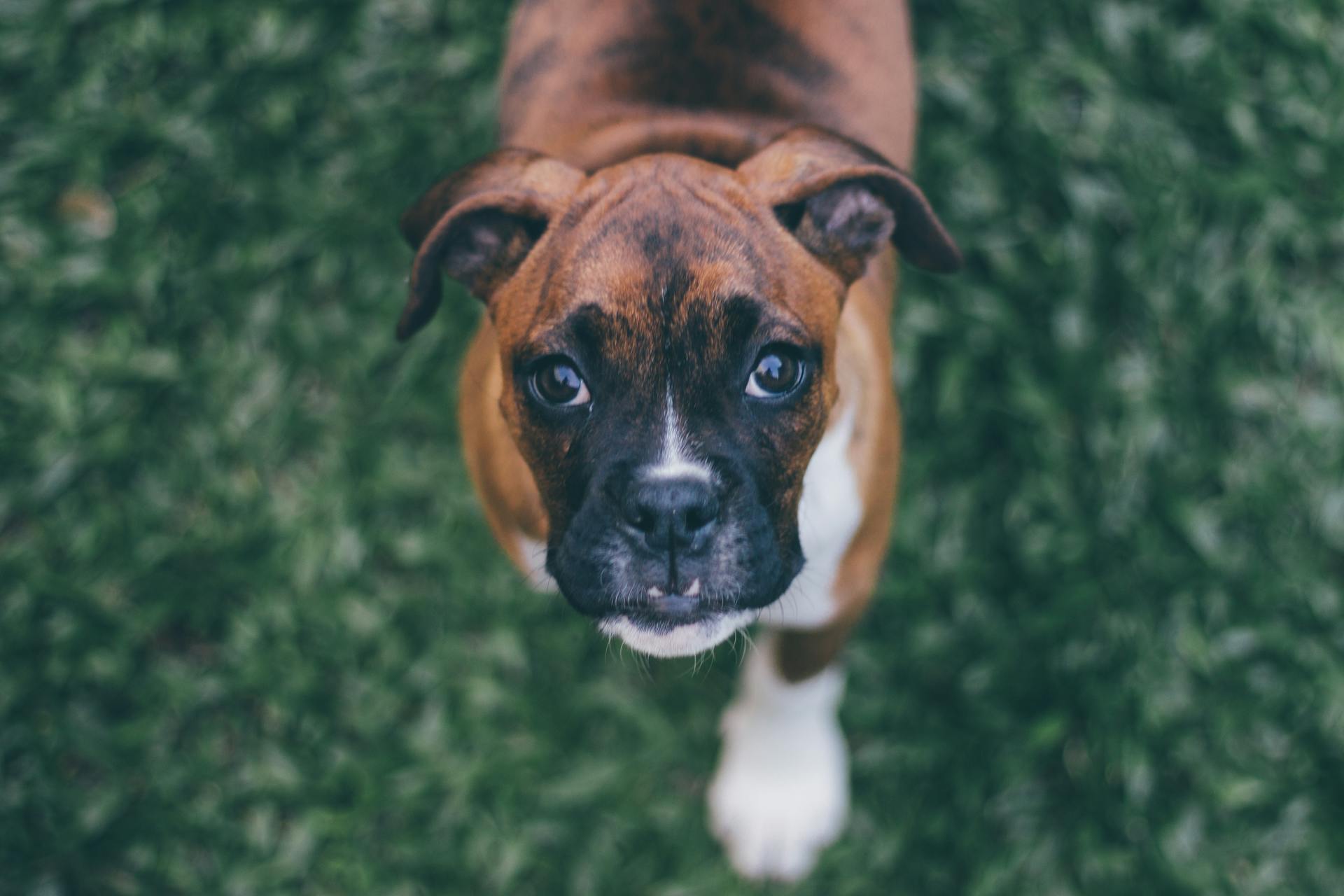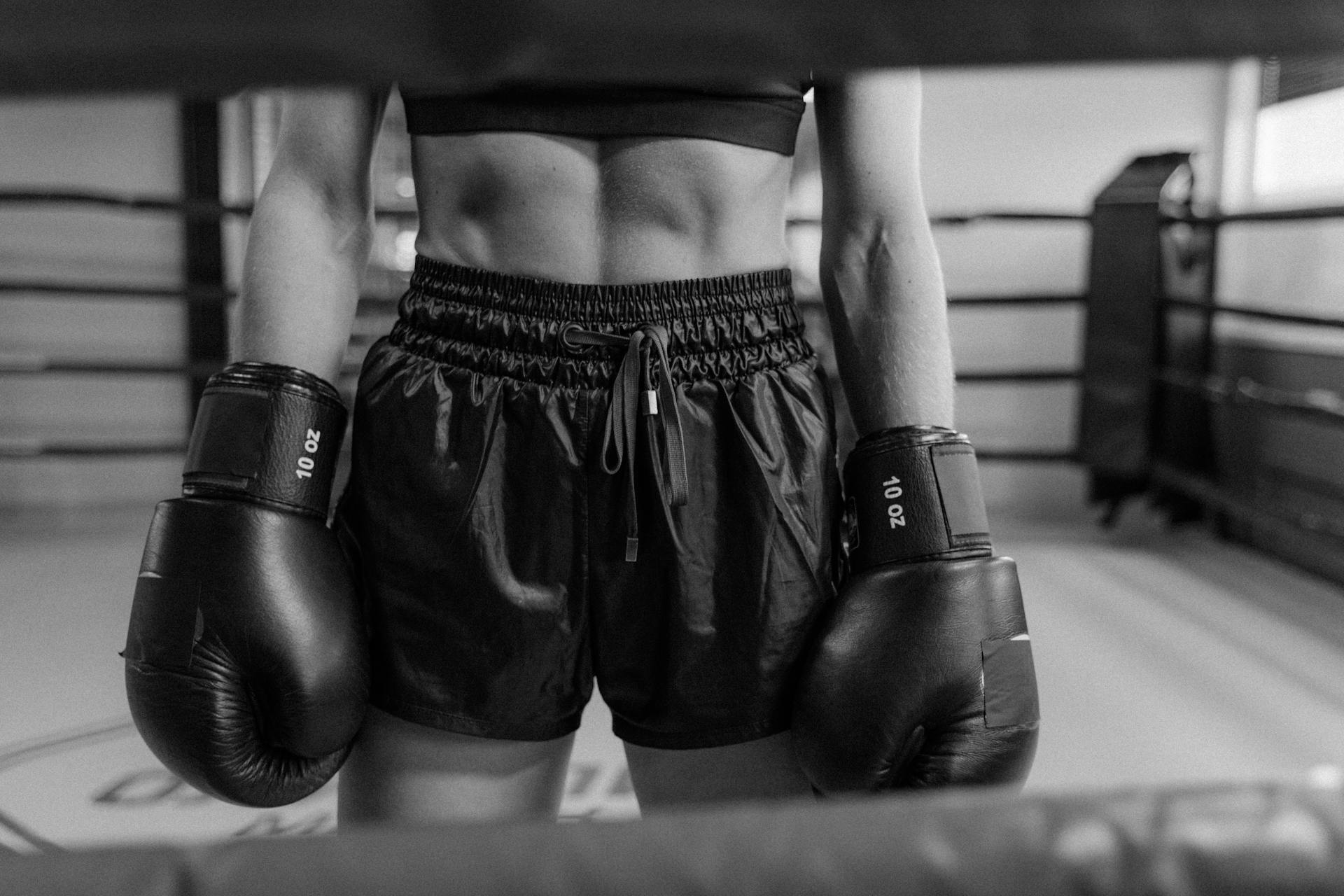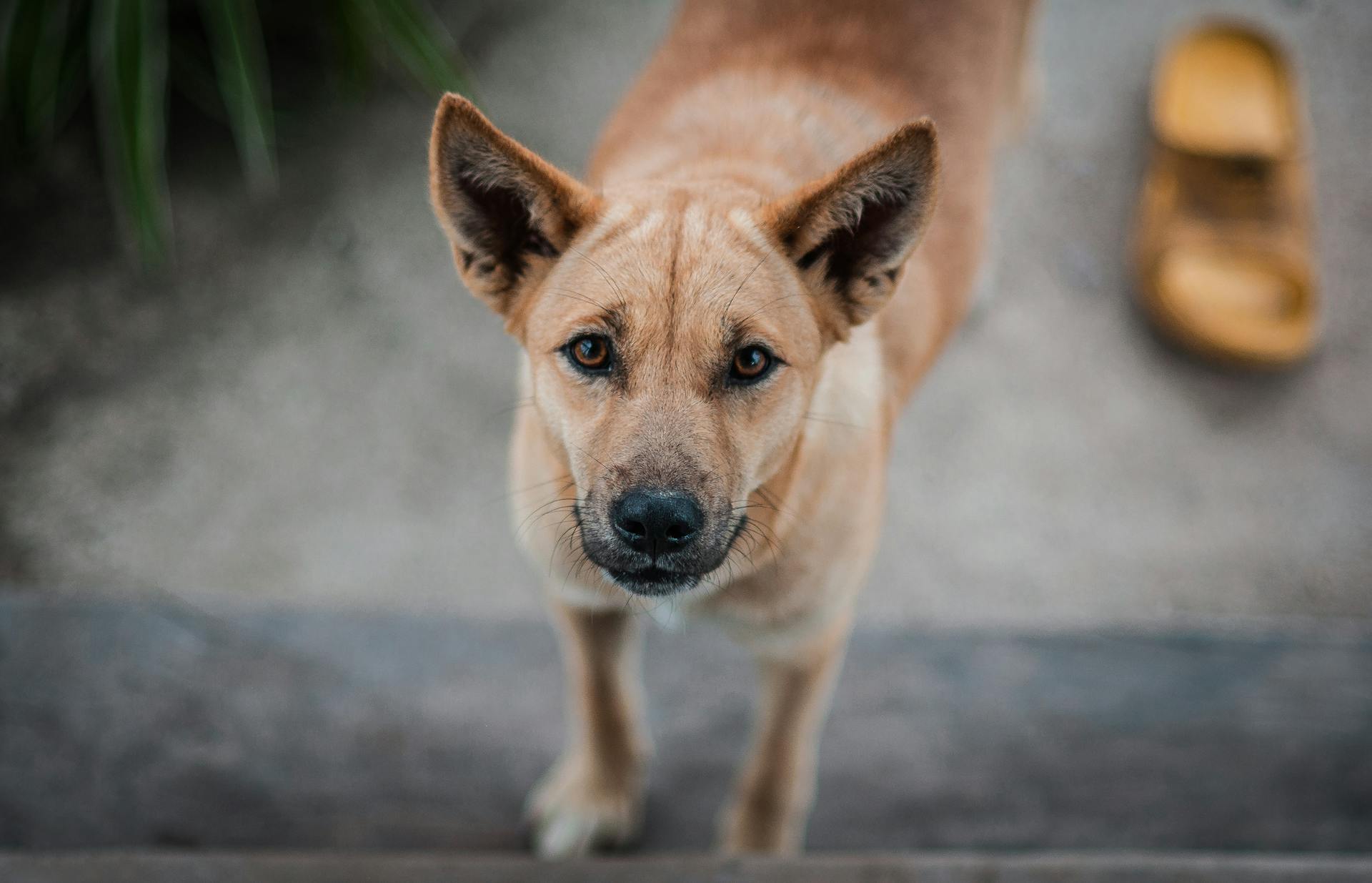
Boxer dogs are a beloved breed, known for their playful and energetic personalities. They originated in Germany in the late 19th century.
Their short coats require minimal grooming, making them a great choice for busy owners. Boxers are generally a healthy breed, but they can be prone to certain health issues.
To keep your boxer happy and healthy, regular exercise is essential. A daily walk or playtime in the park can help burn off excess energy.
Care and Nutrition
Boxer dogs need plenty of exercise, which means their diet should be high in quality calories. They thrive on two meals per day, about every 12 hours, and using slow feeder bowls can help slow them down when they eat, which can help prevent bloat and GDV.
Boxers require 30 minutes to two hours of exercise every day, and providing enough exercise and mental stimulation is a big part of Boxer care. They can excel in dog sports such as rally, agility, and lure coursing.
For more insights, see: How Much Exercise Do Boxer Dogs Need
Boxers are prone to dental problems, increasing their susceptibility for bad breath, so it's essential to keep their teeth and oral cavity in healthy conditions. Dry dog food that is large and difficult for them to chew improves the likelihood for plaque removal.
Feeding a commercial kibble or wet food approved by the Association of American Feed Control Officials (AAFCO) is a good way to make sure a Boxer receives a complete and balanced diet. Boxers need quality protein for healthy muscles, including the heart.
Boxers can benefit from the addition of omega-3 fatty acids (DHA/EPA) into their diets, which can be found in skin and joint supplements, fish oil, and even in some specially formulated dog foods. These fatty acids will act as natural anti-inflammatories that help to support the skin, coat, kidneys, joints, and heart.
Maintaining a healthy weight is very important for protecting a Boxer’s joints, and the recommended caloric intake varies between individuals due to differences in size, metabolism, health, and activity level. The best way to determine how much to feed your Boxer is to talk with your veterinarian and consult the feeding guide labels on your chosen dog food.
Consider reading: Are Boxer Dogs Good Guard Dogs
Health and Wellness
Boxer dogs are prone to several health issues, including cancers, heart conditions, and hypothyroidism, so it's essential to have a strong preventative health routine in place with your veterinarian.
Typically, Boxers live for 10-12 years, but a 2024 UK study found a life expectancy of 11.3 years for the breed.
A 2024 Italian study found a life expectancy of 9 years for the breed, and a 2005 Swedish study of insurance data found 50% of Boxers died by the age of 10, higher than the overall rate of 35% of dogs dying by the age of 10.
Boxer Juvenile Kidney Disease (JKD) is an emerging health concern, where the kidneys don't develop normally during gestation and leads to chronic renal failure, often diagnosed in dogs under the age of 3.
About 22% of puppies die before reaching seven weeks of age, mostly due to stillbirth or infection, which increases significantly with inbreeding.
Consider reading: 100 Years Ago Original Boston Terrier
Health Issues

Boxers are prone to several health issues, so it's essential to have a strong preventative health routine in place.
The typical Boxer lifespan is 10-12 years, but this can vary depending on various factors.
Cancer accounts for 38.5% of Boxer deaths, making it a significant health concern for the breed.
Old age is the second leading cause of death in Boxers, with 21.5% of deaths attributed to it.
Cardiac and gastrointestinal issues also contribute to a significant number of Boxer deaths.
The Boxer breed is particularly predisposed to mast cell tumours, a type of cancer that affects the immune system.
Responsible breeders use available tests to screen their breeding stock before breeding, aiming to minimize the occurrence of these diseases in future generations.
About 22% of puppies die before reaching seven weeks of age, with stillbirth being the most frequent cause of death.
Mortality due to infection increases significantly with increases in inbreeding.
Discover more: Boxers Good Apartment Dogs

The median lifespan of Boxers is 10.25 years, according to a UK Kennel Club health survey.
Boxers are also prone to other health issues, including heart conditions, hypothyroidism, hip dysplasia, and degenerative myelopathy.
These conditions can be inherited, and responsible breeding practices can help minimize their occurrence.
A 2024 UK study found a life expectancy of 11.3 years for the breed, which is lower than the average life expectancy of purebred dogs.
On a similar theme: Life Span of Pug Dog
CCL Disease
CCL Disease is a common issue in many breeds, particularly those with a genetic predisposition. The cranial cruciate ligament, or CCL, is a vital ligament that stabilizes the knee, and its breakdown can lead to tears and joint instability.
Maintaining a lean body condition is crucial in preventing CCL disease, as excess weight puts additional stress on the ligament. In fact, dogs that are overweight are more likely to develop CCL disease.
Dogs that have had a CCL tear in one knee have a 40-60% chance of tearing the other CCL, making it essential to take preventative measures. Regular exercise and a balanced diet can go a long way in keeping your furry friend healthy and CCL disease-free.
Grooming and Appearance
Boxers are relatively low-maintenance when it comes to grooming. They have a short, shiny coat that requires little grooming or bathing, and a weekly brush is all they need to prevent excessive shedding.
Their short coat also means they're not hypoallergenic, so they shed moderately throughout the year. You can expect to give your Boxer a light brush around once a week to keep their coat healthy and to reduce shedding.
Boxers can face health problems due to extreme temperatures, as their squished face makes them susceptible to overheating in hot weather, and their short coat leads to heightened sensitivity in cold temperatures.
Grooming Guide
A Boxer's grooming needs are relatively low-maintenance.
You only need to brush your Boxer's coat once a week to prevent excessive shedding. This simple habit will keep their coat looking shiny and healthy.
Cleaning your Boxer's ears twice a month is crucial to prevent infections. Use a veterinary-approved ear cleaner for this task.
Their short, shiny coat requires little grooming or bathing, making them a great choice for busy owners.
Appearance
The Boxer's distinctive head is the most recognizable feature of the breed. It must be in perfect proportion to the body, with a muzzle that's absolutely proportionate to the skull.
The muzzle should be one-third the length of the head, and folds are always present from the root of the nose running downwards on both sides. The tip of the nose should lie somewhat higher than the root of the muzzle.
A Boxer should be slightly prognathous, meaning the lower jaw protrudes beyond the upper jaw and bends slightly upwards in an underbite or "undershot bite".
The breed standard dictates that the muzzle should never be too light. The American Kennel Club still permits cropped ears, but many countries have banned the practice due to pressure from veterinary associations and animal rights groups.
The tail of a Boxer is typically docked before the cartilage is fully formed, from 3-5 days old. This procedure does not require any sutures when performed at this young age, and anesthesia is not used.
A different take: Bull Terrier Head Shape
Behavior and Training
Boxers have a strong prey drive, so they need to be kept on a leash or in a fenced-in space when outside to prevent chasing smaller animals.
Boxers can be tempted to dig in the yard, so supervision is essential when they're outside. Early leash training can also help prevent pulling on the leash while walking.
Boxers are highly intelligent and trainable, but they require patience due to their high energy level. Positive reinforcement training is key to successful training.
Socializing Boxer puppies at an early age is crucial for their development into confident and polite dogs. This will help them grow into well-adjusted adult dogs that aren't fearful around new people and situations.
Boxers are generally patient with smaller dogs and puppies, but difficulties with larger adult dogs may occur. They are naturally protective of their family and can become attached to their companions.
Take a look at this: What Can You Feed Dogs Other than Dog Food
Behavior and Training
Boxers have a strong prey drive, which means they'll chase birds and small mammals if they get the chance, so it's essential to keep them on a leash or in a fenced-in area when they're outside.
They're also prone to digging in the yard, so supervision is key when your pup is outside. Early leash training can help prevent them from pulling on the leash while walking.
Boxers are happy, playful dogs with a lot of energy, and they love to jump and play. Teaching them to stay down can be beneficial, especially if you have young children who might get knocked over.
However, Boxers can be distrustful of strangers, so socialization is crucial from an early age. Positive reinforcement training is the way to go, as they respond well to rewards and praise.
Boxers are generally patient with smaller dogs and puppies, but they may have difficulties with larger adult dogs, especially those of the same sex. They're great with companionship, whether it's human or canine, and are very comfortable with people of all kinds.
To train a Boxer, you'll need to be patient and consistent, as they can be high-energy and stubborn at times. Reward-based training methods like clicker training work well, and they'll learn quickly if given clear guidance.
Here are some key characteristics to keep in mind when training a Boxer:
- High energy level
- Intelligent and trainable
- Requires patience and consistency
- Responds well to positive reinforcement training
- May be stubborn at times
Overall, Boxers are a wonderful breed that make great family dogs, but they do require some special attention and training. With patience, consistency, and positive reinforcement, you can help your Boxer become a well-behaved and loving companion.
Uses
Boxers are naturally suspicious of strangers, which makes them great guard dogs. They're also very alert, agile, and strong, which is why they excel in dog agility and obedience trials.
Their intelligence and strength also make them suitable for service dog work, guiding the blind, and even herding cattle or sheep. They've even been used as police dogs in K9 units.
As you can imagine, their versatility and trainability have made them a valuable asset in times of war, serving as messenger dogs, pack carriers, and attack dogs.
Frequently Asked Questions
Can a Boxer be left alone?
Boxers are social dogs that require regular interaction and exercise, making them less suitable for long periods of alone time. If you have a busy schedule, a Boxer may need extra attention and stimulation when you're home to prevent boredom and unhappiness.
Do Boxer dogs bark a lot?
Boxer dogs are generally quiet and don't bark excessively, but they can be vocal and make growling noises to communicate.
What 2 breeds make a Boxer?
The Boxer breed originated from the Old English Bulldog and the extinct Bullenbeisser. These two breeds combined to create the Boxer, a member of the Working Group.
Are Boxers high maintenance?
Yes, Boxers are considered high maintenance due to their exercise needs. They require regular physical activity and a secure outdoor space to thrive.
How smart are Boxer dogs?
Boxer dogs are highly intelligent, but their trainability can be inconsistent. They require a strong owner who can provide physical and mental stimulation to keep them engaged and happy.
Featured Images: pexels.com


